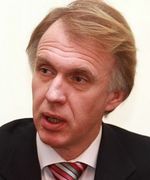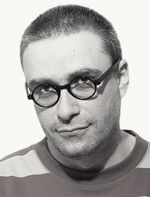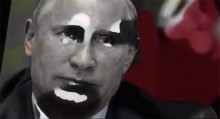On Monday the British TV channel BBC One showed Richard Bilton’s documentary Putin’s Secret Riches in its program Panorama. The film accuses the Russian president of using his office to amass secret fortunes. The director’s estimate is that Vladimir Putin is the wealthiest man in Europe and one of the wealthiest people in the world. His fortune is assessed at 40 billion dollars. Bilton met former Kremlin insiders who claim to know how Putin “hides his riches.”
Yet the most response worldwide was caused by the statement made by US Deputy Treasury Secretary Adam Shubin, who said in the BBC interview that Putin is a corrupt president, who thoroughly hides his true fortunes. “We saw how he enriches his friends and closest allies and marginalizes those he doesn’t consider his friends. No matter whether it is energy or other government contracts he helps those who, in his opinion, will serve him, and excludes those who will not. For me this is a picture of corruption,” said Shubin.
Lieutenant colonel Andrei Zykov, who was in charge of the so-called “Putin case,” shared about the Russian leader’s Spanish property. The money for the construction of the houses was allegedly transferred into Spain by a development corporation, Twentieth Trust. Zykov, then senior investigator for especially important cases, worked on the criminal case investigating the siphoning off the budget money by the corporation’s management. Zykov claims that Putin was personally involved to embezzlement in this company, which was actually created on his orders.
The Day asked Ukrainian and Russian experts to comment the consequences of the British documentary and particularly Shubin’s statement concerning the corrupt activities of the Russian leader.
“THE WEST IS BEGINNING TO REALIZE THAT IT IS IMPOSSIBLE TO FIND COMMON LANGUAGE WITH RUSSIA’S LEADERSHIP”
Volodymyr OHRYZKO, director, Center for Russian Studies; former foreign minister of Ukraine:
 “To this documentary, the US deputy treasury secretary’s statement, and the published report on Litvinenko I would certainly add a film by our Ukrainian director Valerii Balaian, who likewise conducted a very important documentary investigation about the onset of Putin’s career. All in all, this eliminates any ambiguity, leaving only the obvious conclusions. On the other hand, the fact that both the US and UK made almost simultaneous statements concerning the Russian top leader’s corruption and abuse of power testifies that time is running out and he will no longer be considered an equal.
“To this documentary, the US deputy treasury secretary’s statement, and the published report on Litvinenko I would certainly add a film by our Ukrainian director Valerii Balaian, who likewise conducted a very important documentary investigation about the onset of Putin’s career. All in all, this eliminates any ambiguity, leaving only the obvious conclusions. On the other hand, the fact that both the US and UK made almost simultaneous statements concerning the Russian top leader’s corruption and abuse of power testifies that time is running out and he will no longer be considered an equal.
“Such messages to the leader of the neighboring state mean that time has come for him to weigh his prospects. As usual, the West’s liberal democracies are not prone to fast and hard actions, but the course of their reasoning is quite clear. Given the deplorable state of the Russian economy, against the backdrop of plummeting oil prices, the West is seriously considering the chessboard after Putin.
“In my opinion, the key Western leaders might be reconsidering the role of the Kremlin incumbents in today’s global politics. The West is most probably beginning to realize that it is impossible to find a common language with Russia’s leadership and that the incumbents are too discredited and inadequate, and thus any attempts at mending the contacts and seeking mutual understanding are vain. That is why I think that this is more than just a cooling of the relations between Washington and Moscow; it is more likely that the West is indeed beginning to think about the following stages in the development of the Russian political world.”
“WASHINGTON IS SET TO START THE FRIENDSHIP WITH RUSSIA AFTER PUTIN HAS LEFT”
Roman DOBROKHOTOV, leader, democratic movement “We,” Moscow:
 “On the one hand, it is not just a statement by a treasury official, but rather an official statement by the US. On the other, this is an open secret: Putin’s involvement in corruption schemes has long been common knowledge. A lot has been written on the subject, and virtually all the information from the film has been covered in the Russian press in a more or less detailed manner. A lot has also been published in the English-speaking media.
“On the one hand, it is not just a statement by a treasury official, but rather an official statement by the US. On the other, this is an open secret: Putin’s involvement in corruption schemes has long been common knowledge. A lot has been written on the subject, and virtually all the information from the film has been covered in the Russian press in a more or less detailed manner. A lot has also been published in the English-speaking media.
“It is extremely important that, firstly, this program appeared on air of a TV channel with a huge audience. And, secondly, the very fact of an American government official openly accusing Putin of corruption is also very important. Thirdly, this statement is in fact more important than the sanctions, since it sends a message to investors and other states that at the time being there is no warming up in the relations between Washington and Moscow in sight, and there are no backstage talks about forgetting all wrongs and being friends again.
“It is a crucial message for Europeans to understand, especially Eastern Europeans who have always been paranoid about the great powers making a deal with Russia and leaving them fight the Kremlin single-handedly, like they have before. This statement confirms America’s former uncompromising stand on Putin.
“It seems to me that the appearance of such a statement is beneficial to Russia’s civil society as well. Because we used to perceive this standpoint of the West as hypocritical. Back then, everyone seemed to understand that the Kremlin could not but be bogged in corruption in Russia, nor could Putin, and he could not fail to notice it – or be part of it. Yet at the same time, Western leaders would turn a blind eye.
“Meanwhile, yesterday one of the highest-positioned officials imaginable made a statement about Putin being involved in corruption. I may be mistaken, but I do not think that any other government officials, big or small, had ever allowed themselves something of the kind – with the exception of perhaps journalists. Now this hypocrisy is brought to an end. Generally speaking, this is a new milestone, since such statements cannot be withdrawn and forgotten. It probably means that Washington is set to start the friendship with Russia after Putin has left. For me, this is certainly a good sign.”
“RUSSIANS ARE USED TO THIEVISH LEADERS…”
Semen NOVOPRUDSKY, independent journalist, Moscow:
 “To me it seems very unlikely that this film will affect the Russians’ opinion of Putin. One of the problems is conscience, and it takes its toll on the population. The thing is that in Russia neither corruption, nor the bosses’ luxurious lifestyle have ever been stigmatized. Society accepts this as a norm. Unfortunately, Russia’s pain threshold is very high. They are so accustomed to corruption. In this sense, it is a great problem indeed, because it strongly stimulates corruption on everyday level. Unfortunately, a bribe is often seen as a method of solving a problem, and is not considered to be something inadmissible. In this case I think we have exactly the case when the population is as guilty as the government itself (which, actually, benefits from this feature).
“To me it seems very unlikely that this film will affect the Russians’ opinion of Putin. One of the problems is conscience, and it takes its toll on the population. The thing is that in Russia neither corruption, nor the bosses’ luxurious lifestyle have ever been stigmatized. Society accepts this as a norm. Unfortunately, Russia’s pain threshold is very high. They are so accustomed to corruption. In this sense, it is a great problem indeed, because it strongly stimulates corruption on everyday level. Unfortunately, a bribe is often seen as a method of solving a problem, and is not considered to be something inadmissible. In this case I think we have exactly the case when the population is as guilty as the government itself (which, actually, benefits from this feature).
“Concerning Shubin’s statement about Putin being a corrupt president: this moment is meant not so much for the Russians and their perception of their leader. It is rather more important for the outer world’s perception of Putin. In this sense, the publishing of the report on independent investigation into the Litvinenko assassination case and this documentary about Putin are two things of the same sort. Indeed, what used to be limited to the views voiced in the media (which wrote about it anyway in the US, UK, and some other countries), now is becoming something like an official opinion. It can essentially affect the perception of the Russian president in the world – most importantly, on the official level. And he will be treated correspondingly from the political viewpoint. But for Russian people’s perception this does not really matter, of course. What will matter is the substantial decline in their living standards and economic shocks. These matter much more for Russians than their leader’s moral portrait. Russians are used to thievish leaders: this is a norm, embedded in their conscience.”








